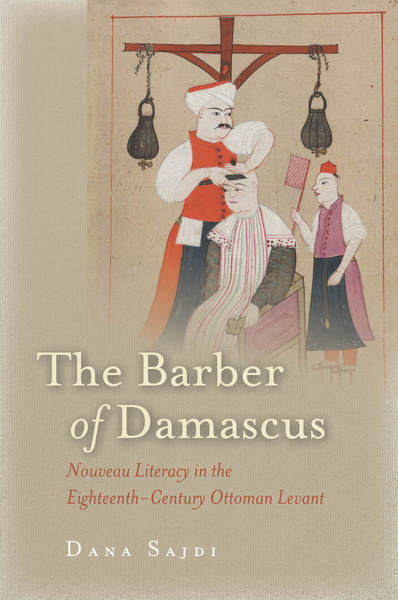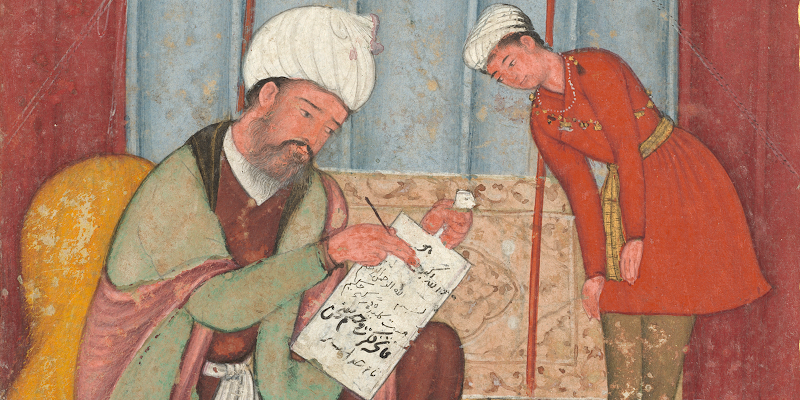Nouveau Literacy in the 18th Century Levant
hosted by Chris Gratien and Shireen Hamza
In the conventional telling of the intellectual history of the Ottoman Empire and the Islamicate world, there has been very little room for people outside the ranks of the learned scholars or ulema associated with the religious, intellectual, and political elite of Muslim communities. But in this episode, we explore the writings of Shihab al-Din Ahmad Ibn Budayr, an 18th-century Damascene barber, as well as a host of writers that our guest Dana Sajdi has described as representatives of "nouveau literacy" in the Ottoman Levant. We discuss how non-elite writers left records of the people and events they encountered during a period of socioeconomic transformation in Greater Syria, and we listen to readings from the text of Ibn Budayr--the barber of Damascus--that bring to life the literary style of the unusual and extraordinary authors who wrote from the margins of the learned establishment in early modern Ottoman society.
This episode is part of an ongoing series entitled "History of Science, Ottoman or Otherwise."
Stream via SoundCloud
PARTICIPANT BIOS
 |
Dana Sajdi is Associate Professor of Middle Eastern History at Boston College. In addition to authoring The Barber of Damascus: Nouveau Literacy in the 18th Century Levant, she is editor of Ottoman Tulips, Ottoman Coffee: Leisure and Lifestyle in the Eighteenth Century (I.B. Tauris, 2008; in Turkish, Koc University Press, 2014).
|
 |
Chris Gratien holds a Ph.D. from Georgetown University's Department of History and is currently an Academy Scholar at the Harvard Academy for International and Area Studies. His research focuses on the social and environmental history of the Ottoman Empire and the modern Middle East. He is currently preparing a monograph about the environmental history of the Cilicia region from the 1850s until the 1950s. |
 |
Shireen Hamza is a doctoral student in the History of Science department at Harvard University. Her research focuses broadly on the history of science and medicine in the Islamicate Middle Ages, and more specifically on the history of women's health.
|
CREDITS
Episode No. 281
Release Date: 11 November 2016
Recording Location: Cambridge, MA
Editing and production by Chris Gratien and Shireen Hamza
Sound excerpts: from archive.org - Istanbul'dan Ayva Gelir Nar Gelir - Azize Tozem and Sari Recep; Katibim (Uskudar'a Gider iken) - Safiye Ayla; from Excavated Shellac- Lili Labassi - Mazal Haye Mazal
Special thanks to Kara Güneş for allowing us to use the composition "Istanbul" in the intro and outro music and to Muhtelif for the use of "Ta Paidia & Lamma Bada"
Image courtesy of Camille Alexandre Otrakji
Bibliography courtesy of Dana Sajdi
IMAGES
 |
| A Damascus Barbershop, circa 1930s (Source: mideastimage.com; courtesy of Camille Alexandre Otrakji) |
SELECT BIBLIOGRAPHY
 |
| The Barber of Damascus by Dana Sajdi Stanford University Press, 2013 |
Hanna, Nelly. In Praise of Books: A Cultural History of Cairo’s Middle Class, Sixteenth to the Eighteenth Century. Syracuse, N.Y: Syracuse University Press, 2003.
Chamberlain, Michael. Knowledge and Social Practice in Medieval Damascus, 1190-1350. Cambridge and New York: Cambridge University Press, 1994.
Rafeq, Abdul-Karim. The Province of Damascus, 1723-1783. 1st ed. Beirut: Khayats, 1966.
Hirschler, Konrad. The Written Word in the Medieval Arabic Lands: A Social and Cultural History of Reading Practices. Edinburgh: Edinburgh University Press, 2012.
Sajdi, Dana. The Barber of Damascus: Nouveau Literacy in the Eighteenth-Century Ottoman Levant. Stanford University Press, 2013.
Schilcher, Linda Schatkowski. Families in Politics: Damascene Factions and Estates of the 18th and 19th Centuries. Wiesbaden: F. Steiner, 1985.










Comments
Post a Comment
Due to an overwhelming amount of spam, we no longer read comments submitted to the blog.